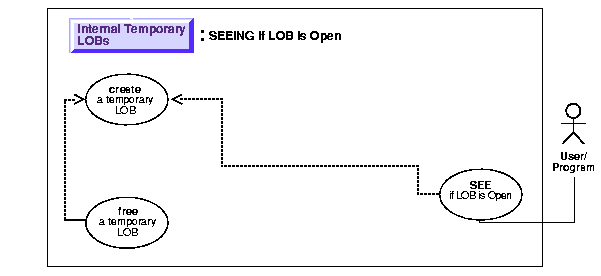Release 1 (9.0.1)
Part Number A88879-01
Home |
Book List |
Contents |
Index | Master Index | Feedback |
| Oracle9i Application Developer's Guide - Large Objects (LOBs) Release 1 (9.0.1) Part Number A88879-01 |
|
Temporary LOBs, 9 of 29

|
See:
"Use Case Model: Internal Temporary LOBs", for all basic operations of Internal Temporary LOBs. |
This procedure describes how to see if a temporary LOB is open.
Not applicable.
sSee Chapter 3, "LOB Support in Different Programmatic Environments" for a list of available functions in each programmatic environment. Use the following syntax references for each programmatic environment:
These generic examples takes a locator as input, create a temporary LOB, open it and test if the LOB is open.
Examples are provided in the following programmatic environments:
/* Note that the example procedure seeTempLOBIsOpen_proc is not part of theDBMS_LOBpackage. This procedure takes a locator as input, creates a temporaryLOB, opens it and tests if theLOBis open. */ CREATE OR REPLACE PROCEDURE seeTempLOBIsOpen_proc(Lob_loc IN OUT BLOB, Retval OUT INTEGER) IS BEGIN /* Create the temporary LOB: */ DBMS_LOB.CREATETEMPORARY(Lob_loc,TRUE); /* See If the LOB is open: */ Retval := DBMS_LOB.ISOPEN(Lob_loc); /* The value of Retval will be 1 if the LOB is open. */ /* Free the temporary LOB: */ DBMS_LOB.FREETEMPORARY(Lob_loc); END;
/* This function takes a locator and returns 0 if the function completes successfully. The function prints out "Temporary LOB is open" or "Temporary LOB is closed". It does not check whether or not the locator is actually pointing to a temporary LOB or not, but the open or close test will work either way. The function returns 0 if it completes successfully, and -1 if it fails. */ sb4 seeTempLOBIsOpen (OCILobLocator *lob_loc, OCIError *errhp, OCISvcCtx *svchp, OCIStmt *stmthp, OCIEnv *envhp) { boolean is_open = FALSE; printf("in seeTempLOBIsOpen \n"); if(OCILobCreateTemporary(svchp, errhp, lob_loc, (ub2)0, SQLCS_IMPLICIT, OCI_TEMP_BLOB, OCI_ATTR_NOCACHE, OCI_DURATION_SESSION)) { (void) printf("FAILED: CreateTemporary() \n"); return -1; } if(OCILobIsOpen(svchp, errhp, lob_loc, &is_open)) { printf("OCILobIsOpen FAILED\n"); return -1; } if(is_open) { printf("Temporary LOB is open\n"); }else { printf("Temporary LOB is closed\n"); } if(OCILobFreeTemporary(svchp,errhp,lob_loc)) { printf("OCILobFreeTemporary FAILED \n"); return -1; } return 0; }
This script is also located at $ORACLE_HOME/rdbms/demo/lobs/cobol/tload
IDENTIFICATION DIVISION. PROGRAM-ID. TEMP-LOB-ISOPEN. ENVIRONMENT DIVISION. DATA DIVISION. WORKING-STORAGE SECTION. 01 USERID PIC X(11) VALUES "SAMP/SAMP". 01 TEMP-BLOB SQL-BLOB. 01 SRC-BFILE SQL-BFILE. 01 DIR-ALIAS PIC X(30) VARYING. 01 FNAME PIC X(20) VARYING. 01 DIR-IND PIC S9(4) COMP. 01 FNAME-IND PIC S9(4) COMP. 01 AMT PIC S9(9) COMP. 01 IS-OPEN PIC S9(9) COMP. 01 ORASLNRD PIC 9(4). EXEC SQL INCLUDE SQLCA END-EXEC. EXEC ORACLE OPTION (ORACA=YES) END-EXEC. EXEC SQL INCLUDE ORACA END-EXEC. PROCEDURE DIVISION. TEMP-LOB-ISOPEN. EXEC SQL WHENEVER SQLERROR DO PERFORM SQL-ERROR END-EXEC. EXEC SQL CONNECT :USERID END-EXEC. * Allocate and initialize the BLOB locators: EXEC SQL ALLOCATE :TEMP-BLOB END-EXEC. EXEC SQL LOB CREATE TEMPORARY :TEMP-BLOB END-EXEC. * Open temporary LOB: EXEC SQL LOB OPEN :TEMP-BLOB READ ONLY END-EXEC. EXEC SQL LOB DESCRIBE :TEMP-BLOB GET ISOPEN INTO :IS-OPEN END-EXEC. IF IS-OPEN = 1 * Logic for an open temporary LOB goes here: DISPLAY "Temporary LOB is OPEN." ELSE * Logic for a closed temporary LOB goes here: DISPLAY "Temporary LOB is CLOSED." END-IF. EXEC SQL ROLLBACK WORK RELEASE END-EXEC. STOP RUN. SQL-ERROR. EXEC SQL WHENEVER SQLERROR CONTINUE END-EXEC. MOVE ORASLNR TO ORASLNRD. DISPLAY " ". DISPLAY "ORACLE ERROR DETECTED ON LINE ", ORASLNRD, ":". DISPLAY " ". DISPLAY SQLERRMC. EXEC SQL ROLLBACK WORK RELEASE END-EXEC. STOP RUN.
This script is also located at $ORACLE_HOME/rdbms/demo/lobs/proc/tifopen
#include <oci.h> #include <stdio.h> #include <sqlca.h> void Sample_Error() { EXEC SQL WHENEVER SQLERROR CONTINUE; printf("%.*s\n", sqlca.sqlerrm.sqlerrml, sqlca.sqlerrm.sqlerrmc); EXEC SQL ROLLBACK WORK RELEASE; exit(1); } void tempLobIsOpen_proc() { OCIBlobLocator *Temp_loc; int isOpen = 0; EXEC SQL WHENEVER SQLERROR DO Sample_Error(); /* Allocate and Create the Temporary LOB */ EXEC SQL ALLOCATE :Temp_loc; EXEC SQL LOB CREATE TEMPORARY :Temp_loc; /* Open the Temporary LOB */ EXEC SQL LOB OPEN :Temp_loc READ ONLY; /* Determine if the LOB is Open */ EXEC SQL LOB DESCRIBE :Temp_loc GET ISOPEN INTO :isOpen; if (isOpen) printf("Temporary LOB is open\n"); else printf("Temporary LOB is not open\n"); /* Note that in this example, the LOB is Open so isOpen == 1 (TRUE) */ /* Close the LOB */ EXEC SQL LOB CLOSE :Temp_loc; /* Free the Temporary LOB */ EXEC SQL LOB FREE TEMPORARY :Temp_loc; /* Release resources held by the Locator */ EXEC SQL FREE :Temp_loc; } void main() { char *samp = "samp/samp"; EXEC SQL CONNECT :samp; tempLobIsOpen_proc(); EXEC SQL ROLLBACK WORK RELEASE;}
|
|
 Copyright © 1996-2001, Oracle Corporation. All Rights Reserved. |
|